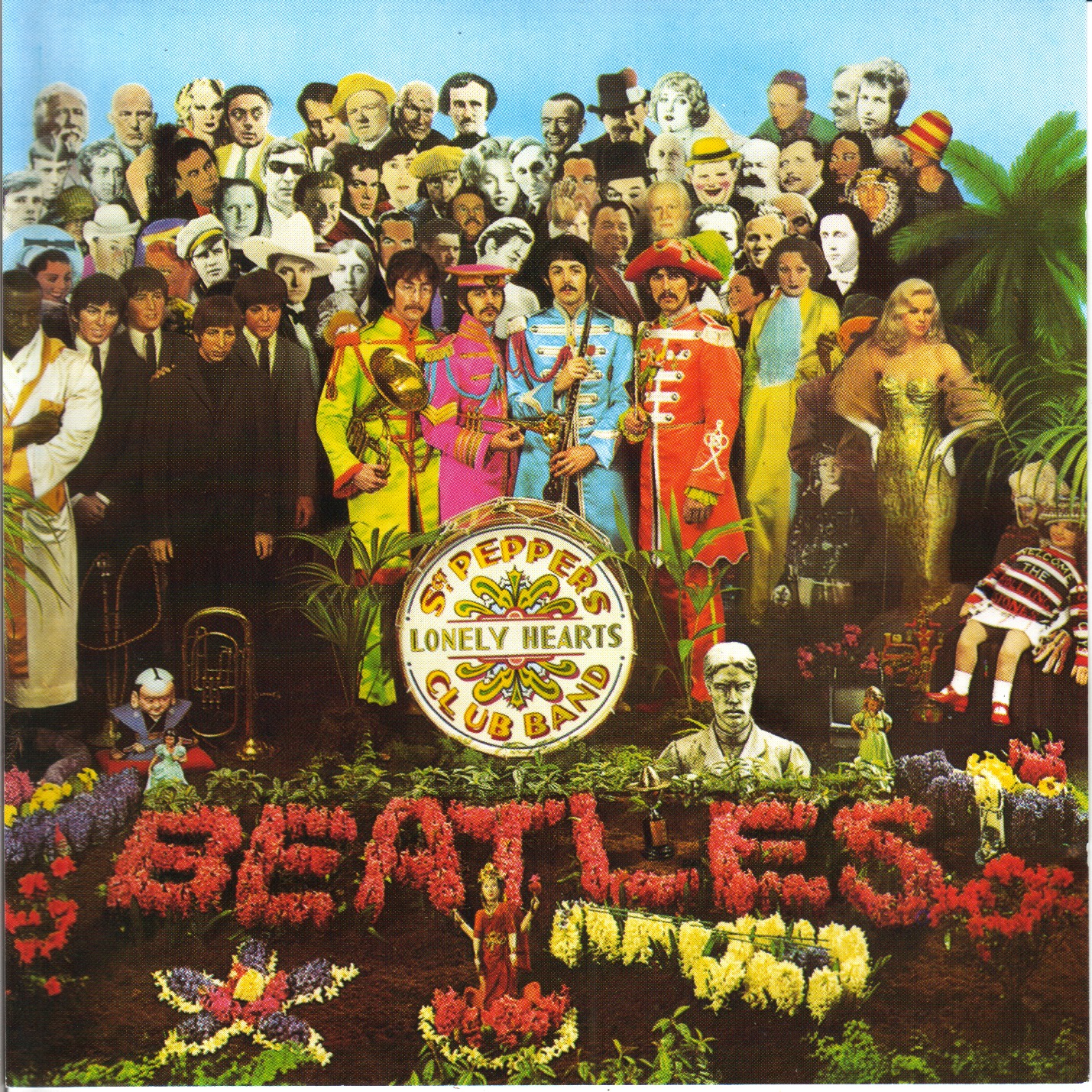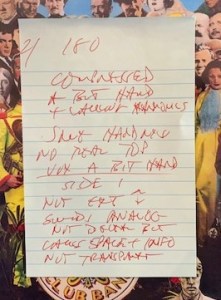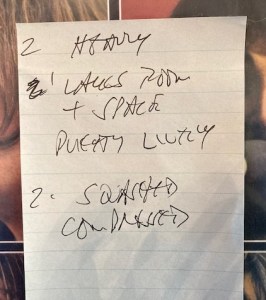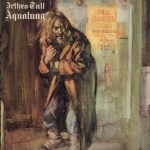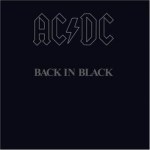
Hot Stamper Pressings of Rubber Soul
Reviews and Commentaries for Rubber Soul
[This review was originally written in 2015.]
We are so excited to tell you about the first of the Heavy Vinyl Beatles remasters we’ve played! As we cycle through our regular Hot Stamper shootouts for The Beatles’ albums we will be of course be reviewing more of them*. I specifically chose this one to start with, having spent a great deal of time over the last year testing the best vinyl pressings against three different CD versions of Rubber Soul.
The short version of our review of the new Rubber Soul vinyl would simply point out that it’s awful, and, unsurprisingly, it’s awful in most of the ways that practically all modern Heavy Vinyl records are: it’s opaque, airless, energy-less and just a drag.
I was looking forward to the opportunity to take Michael Fremer, the foremost champion of thick vinyl from sources far and wide, to task in expectation of his rave review, when to my surprise I found the rug had been pulled out from under me — he didn’t like it either. Damn!
MF could hear how bad it was. True to form, he thinks he knows why it doesn’t sound good:
As expected, Rubber Soul, sourced from George Martin’s 1987 16 bit, 44.1k remix sounds like a CD. Why should it sound like anything else? That’s from what it was essentially mastered. The sound is flattened against the speakers, hard, two-dimensional and generally hash on top, yet it does have a few good qualities as CDs often do: there’s good clarity and detail on some instruments. The strings are dreadful and the voices not far behind. The overall sound is dry and decay is unnaturally fast and falls into dead zone.
It strikes me as odd that the new vinyl should sound like a CD. I have listened to the newly remastered 2009 CD of Rubber Soul in stereo extensively and think it sounds quite good, clearly better than the Heavy Vinyl pressing that’s made from the very same 16 bit, 44.1k remixed digital source.
If the source makes the new vinyl sound bad, why doesn’t it make the new CD sound bad? I can tell you that the new CD sounds dramatically better than the 1987 CD I’ve owned for twenty years. They’re not even close. How could that be if, as MF seems to believe, the compromised digital source is the problem?
Fortunately I didn’t know what the source for the new CD was when I was listening to it. I assumed it came from the carefully remastered hi-rez tapes that were being used to make the new series in its entirety, digital sources that are supposed to result in sound with more analog qualities. Well, based on what I’ve heard, they do, and those more analog qualities obviously extend to the new Rubber Soul compact disc. At least to these ears they do.
Possibly my ignorance of the source tape allowed me to avoid the kind of confirmation bias — hearing what you expect to hear — that is surely one of the biggest pitfalls in all of audio.
Doors Progress
He raved about the digitally remastered Doors Box Set when it came out, but now that Acoustic Sounds is doing Doors albums on 45 he is singing a different tune:
Whatever I wrote about that box then [5/1/2010 if you care to look it up], now, by comparison, the best I can say for The Doors on that set is that it sounds like you’re hearing the album played back on the best CD player ever. It’s smoooooth, laid back and pleasant but totally lacks balls, grit, detail, spaciousness and raw emotional power. The entire presentation is flat against a wall set up between the speakers. The double 45 has greater dynamics, detail, spaciousness and appropriate grit—everything the smooooth 192k/24 bit sourced version lacks.
We, on the other hand, had no trouble at all hearing how bad it was right from the start. For our last Hot Stamper shootout winner of The Soft Parade we noted:
Need I even mention how much better this copy sounds than the recent 180g version from the Rhino Box Set, digitally remastered by Bernie Grundman? That thing is just awful, possibly the worst sounding pressing I have ever heard. The Gold CD Hoffman did for Audio Fidelity would be night and day better. So much for the concept of vinyl superiority. Not with Bernie at the helm.
To his credit MF finally recognizes his mistake, but let’s stop and think about how he came by this insight. He did it by playing a pressing that, to his mind, has every reason to sound better, being sourced from analog tapes and mastered at 45. Now he hears that Bernie’s cutting sounds like a CD. To us it sounded worse than a CD when we played it the first time, vinyl or no vinyl. We even recommended the Hoffman-mastered DCC Gold CDs for those who didn’t want to spring for one of our Hot Stamper pressings. As we like to say, good digital beats bad analog any day.
Real Progress
Then again, who are we to talk? Bear in mind that as recently as 2000-something we were still recommending the DCC vinyl pressings, records that I can’t stand to listen to these days. My system couldn’t show me how colored and lifeless they were then, but it sure can now.
It’s amazing how far you can get in 10 years if you’re obsessive enough and driven enough and are willing to devote huge amounts of your time and effort to the pursuit of better audio. This will be especially true if you are perfectly happy to let your ears, not your brain, inform your understanding of the sound of the records you play.
If we thought like most audiophiles, that money buys good sound and original pressings are usually the best, there would be no such thing as Hot Stampers.
That’s Fremer’s world, not ours. He’s making progress in some areas, not so much in others, but man, he sure has a long way to go. At this rate it will take him forever. It just goes to prove that Mistaken Thinking can really slow down your progress.
Take our advice (and stop taking his, which is also our advice) and you will be amazed at the positive changes that are sure to come your way.
So, What’s The Grade?
MF’s grade for the new Rubber Soul pressing was a 5 on a scale of 1 to 11. If we were to follow the more standard scale of 1 to 10, we would probably give Rubber Soul a 2, at most 2.5 (and that’s only if we were in an expecially generous mood). The new record is a drag, and even the remastered CD is better. Under those circumstances how can the 180 gram pressing be a 5? Maybe in Fremer’s world you automatically get three points for being made out of vinyl. He seems to really like the stuff, even when it doesn’t sound good. Never could figure that one out.
More Beatles Heavy Vinyl?
Due to the heavy volume of mail on the subject (2 emails flooded in!) we finally broke down and bought the set. As we pursue our Hot Stamper shootouts of The Beatles’ catalog we will be commenting on how the new pressings sound from time to time and in no particular order. We’re also in no particular hurry; practically nothing on Heavy Vinyl impresses us these days and we expect The Beatles records to be no different, rave reviews (for most of them) from audiophile reviewers notwithstanding.
UPDATE 2021
After playing two titles and hearing the same mediocre sound, this survey is on indefinite hiatus.
Who has the time to play crappy records, especially when there are so many good ones, or potentially good ones, that we don’t find the time to get to as it is?

 The new mixes also lacked Tubey Magic, which, for any album by The Beatles, is every bit the kiss of death that a phony midrange is. The Beatles albums remastered on Heavy Vinyl that we’ve played left a lot to be desired in that area, in addition to their many other faults.
The new mixes also lacked Tubey Magic, which, for any album by The Beatles, is every bit the kiss of death that a phony midrange is. The Beatles albums remastered on Heavy Vinyl that we’ve played left a lot to be desired in that area, in addition to their many other faults. Hot Stamper Pressings of the Music of The Beatles Available Now
Hot Stamper Pressings of the Music of The Beatles Available Now

